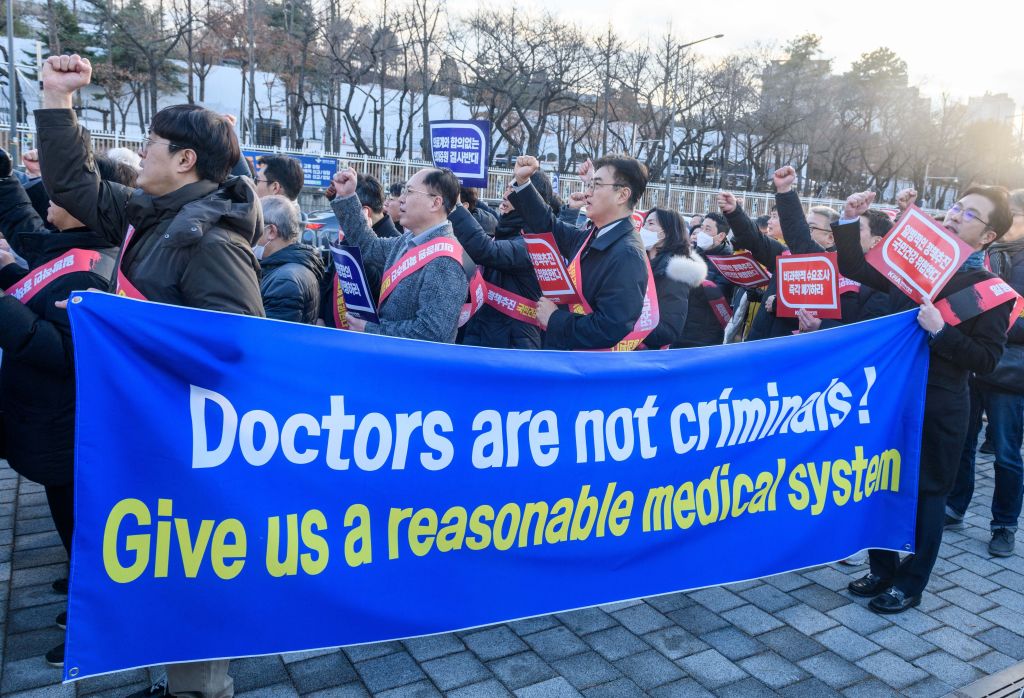
As South Korea’s health care system reels from a doctors’ strike that has left hospitals desperately understaffed for a little over a week now, authorities have issued their first legal crackdown on alleged organizers of the collective action. On Tuesday, the health ministry lodged a criminal complaint against five doctors affiliated with the Korean Medical Association, whom authorities suspect of instigating the strike, on charges of violating medical law and obstruction of justice, local media reported.
As of Monday evening, around 9,000 trainee doctors—or 73% of South Korea’s total number of trainees—have walked off the job, while nearly 10,000 have tendered their resignations in protest of a government plan to increase the annual quota for medical students from 3,058 to 5,058 beginning in 2025. More than 13,000 current medical students across the country—making up 70% of the total—have joined the protest and filed for leaves of absence from school.
The striking doctors say they were not properly consulted about the quota expansion, which they argue will do little to address the country’s shortage of doctors in certain fields, including pediatrics, emergency medicine, and general surgery. But critics say that the doctors are merely worried the proposed quota increase would put their existing social prestige and competitive pay at risk.
South Korean President Yoon Suk-yeol said on Tuesday that the government would go ahead with the quota expansion of medical students, which remains publicly popular despite the doctor protest, adding that the state would be “failing in its constitutional duty” if it did not provide proper medical care to the public.
“This is not a matter for negotiations or compromise,” he said.
A spokesperson for the Korean Medical Association told Bloomberg that the five members targeted in the complaint, which he described as “an exercise of unfair government power,” were willing to explain their case if summoned by authorities.
Since the strike began on Feb. 20, authorities have urged doctors to return to work by Thursday, promising immunity against disciplinary consequences if the deadline is met while threatening harsh penalties for those who continue to strike, including the suspension of medical licenses and even criminal prosecution.
“Starting March, suspending licenses and initiating legal proceedings will be unavoidable for those who do not return,” Health Minister Cho Kyoo-hong said Tuesday.
Senior figures in the Korean Medical Association as well as the Korean Intern Resident Association are being investigated on potential charges including violation of medical law, police said Monday. Seoul police also said it was investigating an anonymous online post urging trainee doctors to delete patients’ data before resigning.
Meanwhile, hospitals have been tossed into chaos, forced to cancel surgeries and treatments, including for cancer patients, and reliant on nurses to take on greater responsibilities. Among emergency measures introduced by authorities, emergency rooms in military hospitals have been opened to receive public patients, while operating hours at public hospitals have been extended. Authorities have said that they are investigating reports that a woman in her 80s died of cardiac arrest after being turned away from seven hospitals amid a shortage of doctors; however, Vice Health Minister Park Min-soo said the woman had terminal cancer and her death did not appear to be related to the refusal by hospitals.
“How do they expect the country or patients like me to support their walkout when they’re leaving us to die?” Kim Sung-ju, the head of the Korean Cancer Patients Rights Council and a cancer patient himself told the Washington Post.
“We regret that we have to convey the voices of young doctors in this way,” the Korean Intern Resident Association said in a statement on Feb. 20, the first day of the strike. “We hope that the government will quickly reconsider its current policy and present the right policy by reflecting the voices of medical residents.”
More Must-Reads from TIME
- Donald Trump Is TIME's 2024 Person of the Year
- Why We Chose Trump as Person of the Year
- Is Intermittent Fasting Good or Bad for You?
- The 100 Must-Read Books of 2024
- The 20 Best Christmas TV Episodes
- Column: If Optimism Feels Ridiculous Now, Try Hope
- The Future of Climate Action Is Trade Policy
- Merle Bombardieri Is Helping People Make the Baby Decision
Contact us at letters@time.com